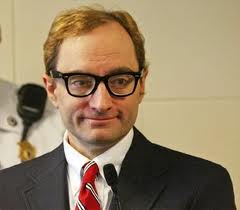One of my favorite works by Thomas Mann is the ironic Bildungsroman Bekenntnisse des Hochstaplers Felix Krull. Felix, whose ambition and talent for acting – and lying – , take him from a small town in Germany to aristocratic circles in Paris, is able to effortlessly deceive people about his true background and identity. People – especially upper bourgeois and aristocratic variety – project on Felix their own fantasies, to which he gladly adapts.
But Felix Krull was a rank amateur compared to Christian Karl Gerhartsreiter, who for years was able to fool people – including two wives – that he belonged to America's iconic aristocratic families – the Rockefellers. Not bad for someone who grew up in rural Upper Bavaria:
Am 21. Februar 1961 wird in Siegsdorf der kleine Christian geboren und
wächst im benachbarten Bergen auf, nahe der österreichischen Grenze. Der
Chiemgau muss eine kleine, enge Welt gewesen sein. Zu eng und zu klein
für die großen Träume des jungen Gerhartsreiter. Der Vater ist
Landschaftsmaler, die Mutter arbeitet als Näherin. In der Schule gibt
Christian gern den Klassenclown. Er spielt Telefonstreiche und ordert
gleich zwei Rolls-Royce. Das zeigt sein Talent.(Little Christian was born on February 21, 1961 and grew up in the surrounding mountains, close to the Austrian border. The Cheimgau must have seemed like a small, circumsribed world. Too small for the big dreams of young Gerhartsreiter. The father paints landscapes, the mother works as a seamstress. At school Christian plays the class clown. He plays pranks on the telephone and orders two Rolls-Royces. This shows his talent. )
Christian set out for America, where, to quote PT Barnum "There's a sucker born every minute." The rest is history, and stuff of made for TV movies.
It's hard to imagine being taken in by an utterly absurd Hochstapler like Gerhartsreiter, but the writer Walter Kirn ("Up in the Air") has a terrific piece in the New Yorker which describes in detail how it can happen. (unfortunately, the piece is behind the paywall) KIrn was friends with "Clark Rockefeller" for 15 years – you might even say he was a close friend, and, despite numerous signs that things were amiss, never questioned Clark's identity. It was only at Gerhartsretier's murder trial did the magnitude of the deception sink in. Kirn describes his total humiliation:
"Getting to know an old friend through his murder trial after failing to know him through normal means is a formula for humiliation. As Balian falled his last few witnesses and reporters placed their bets, and reporters placed their bets, anticipating a hung jury, I started replaying scenes in my mind, imagining what would have happened had I been less eager to collaborate in Clark's fantasies and cover stories. When fresh information discredits past perceptions, the underlying memories don't change; you're left to construct a new puzzle from the shaken-loose pieces of the old one. It's infuriating. And the fury wants an object that's not yourself."
KIrn's piece is brutally honest, and shows in detail how easily we can fall for conmen like Gerhartsreiter or Bernie Madoff


